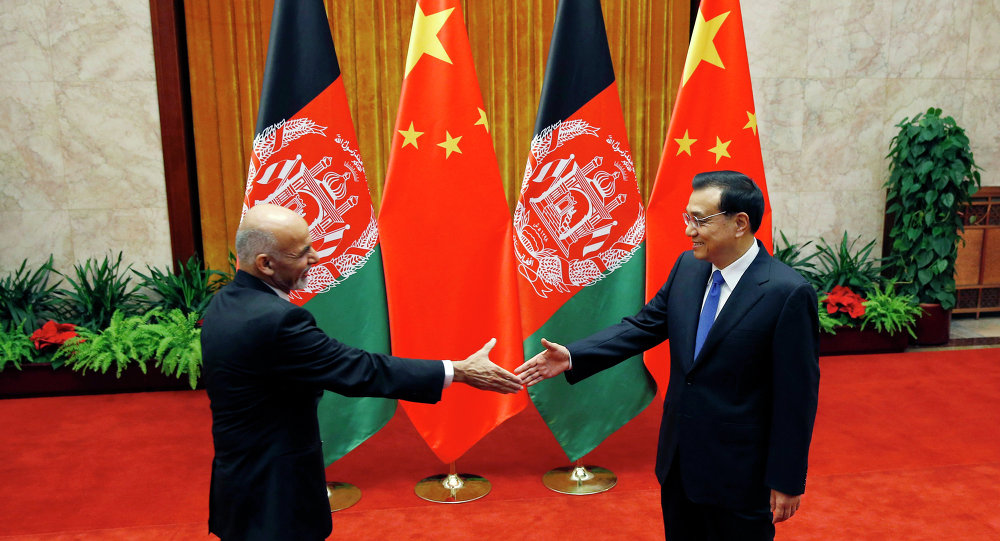
In July 2015, China announced it would host the second round of talks between the Afghan Taliban and the Afghan government later this year. China will be taking part in this dialogue as a mediator, as will Pakistan. Whether one considers how China is seen by Afghanistan or how Afghanistan is seen by China, both countries’ views of each other have experienced great fluctuations since the commencement of the war in 2001.
In October 2014, China hosted the fourth foreign ministers’ meeting of the “Istanbul Process,” a forum that was initiated in 2001 to enhance Afghanistan’s connections with its neighbors. As the host of this important dialogue, China exhibited that it is now eager to play a more vibrant role in the Afghan political maze. In December 2014, only two months later, China also hosted an Afghan Taliban designation in an effort to set a negotiation path for further dialogue between the Afghan Taliban and the Afghan government.
In the latter half of the 20th century, China had only limited connections with Afghanistan. The limitations were not only because both sides share only 91 kilometers of border, but were also due to Afghanistan’s inclination towards the former Soviet Union. Kabul was the recipient of huge economic and political support from Moscow. Positive memories of Soviet assistance to Afghanistan, however, were marred by the 1979-1989 invasion. In 2001, the United States landed in Afghanistan with a large number of troops and replaced the Soviets’ political and security role. China certainly had its role to play during both these periods, being a permanent member of the United Nations Security Council, but the role would not prove to be a decisive one.
Today, the situation has completely changed. The United States is on the verge of complete withdrawal from Afghanistan, and the international community sees a larger role for China in Afghanistan’s reconstruction and political stability. Moreover, the Afghan government is also seeking greater Chinese investment – both in the economy and Afghanistan’s political future. These aspirations were well-publicized by former Afghan President Hamid Karzai during his visit to China in 2013. He said, Afghanistan “expects China to continue taking a constructive role in realizing peace, security and stability in Afghanistan and in improving Afghanistan’s relations with its neighboring countries.” Ashraf Ghani also paid an important visit to China soon after assuming office in 2014, seeking greater Chinese involvement in Afghan affairs.
For Beijing, Afghanistan is now more than a state that poses security threats to China and the wider region. Although political and security implications still linger, China now sees Afghanistan as a potential economic market. In part due to Xi Jinping’s new leadership and interest in the country, Afghanistan may well become an extended part of China’s sphere of influence. Chinese economic maneuverings in Afghanistan are already flourishing. China has given $240 million in aid to Afghanistan since 2001 and an additional $80 million alone in 2014. Beijing has also pledged to provide another $240 million over the next three years. A Chinese company won exploration rights of the Aynak Copper Mines in 2008, and China National Petroleum Corporation signed a deal in 2011 for access to oil fields in Sari-Pul and Faryab province. Investment in such projects is a win-win situation for both parties. China will feed its energy-hungry economy and fuel sustainable economic growth, while Afghanistan benefits from new infrastructure and jobs.
China is also working to form new trade routes and restore ancient ones, such as the Silk Road. President Xi Jinping, at the Asia Pacific Economic Cooperation (APEC) summit in 2013, proposed to establish a “Silk Road Economic Belt” through Asia. It includes the restoration of the ancient Silk Road between Europe and China via Afghanistan and Central Asia, stretching to Iran, the Middle East, and to the Indian Ocean to the Chinese-funded Gwadar port in Pakistan. As Afghanistan lies at the crossroads of Central and West Asia, it is vital for future Chinese, economic corridor plans.
In spite of these optimistic calculations, China will still face problems of political and security unrest in Afghanistan. To tackle this challenge, China has shown readiness to facilitate mediation in political talks between the Afghan Taliban and the Afghan government. Furthermore, Beijing has offered to train 300 Afghan police officers and 3,000 Afghan professionals. Chinese domestic security also benefits from Chinese security assistance to Afghanistan. Uighur militants operating in China’s Xinjiang province have connections with the Afghan Taliban. Beijing also wants to use the Shanghai Cooperation Organization (SCO) platform to push for Afghanistan’s security and stability. Afghanistan was given observer status at the 2012 SCO Summit by China’s request.
China will have given much consideration to the pros and cons of opening its arms to Afghanistan before becoming a dynamic player in its political puzzle. Beijing knows that bringing all the political and ethnic groups to the negotiating table simultaneously is a daunting task, which can only be accomplished if neighboring and regional countries are taken on board. For this reason, China has realigned its Afghan policy and has established multi-dimensional connections with Russia, Pakistan, and Central Asian states. Moreover, China is not overtaking U.S. interests in Afghanistan; rather, it is seeking to make inroads through soft power and economic investment. For its part, Washington has backed Chinese maneuvering, deeming it a positive force in the region. The degree of China’s success in turning war-torn Afghanistan into an essential and safe trade route is a million dollar question, which may be answered in the coming decade.
***
Image: Kim Kyung-Hoon-Pool, Getty


